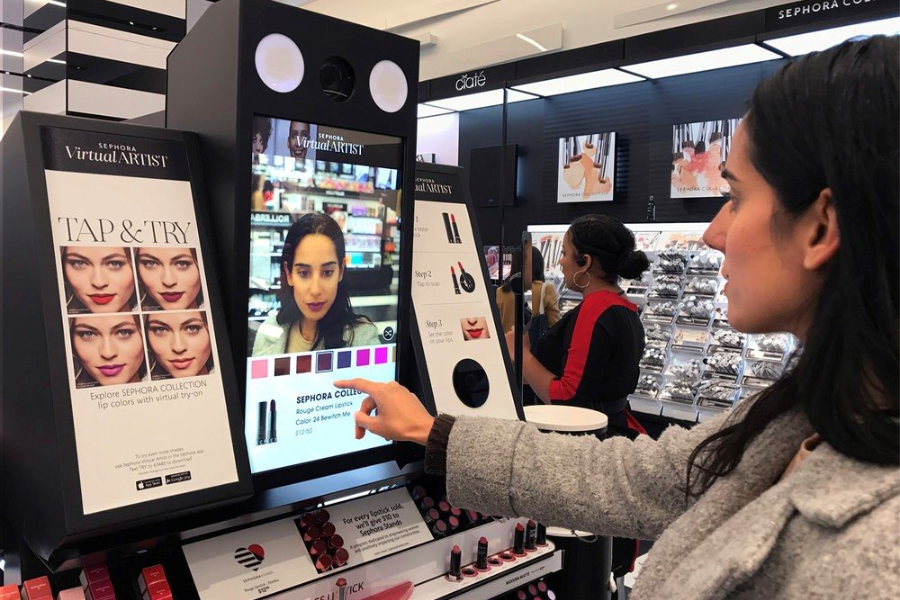AI helps retailers create highly personalized store experiences, fight fraud, and accurately predict demand
Most shoppers might not notice, but AI is now a crucial part of the retail and e-commerce world. Chatbots handle return requests, and smart algorithms suggest items to add to your cart before you check out.
However, a much larger revolution is taking place behind all of this. AI is enabling retailers to craft hyper-personalized shopping experiences, boost fraud protection, and forecast demand with high precision. Let’s explore the practical ways AI is transforming the retail industry in this blog!
Roles of AI in Retail and E-Commerce Fields
1. Demand Forecasting and Inventory Optimization
Retail demand is always difficult to predict. Trends can change rapidly in the era of social media, requiring sellers to keep up or face an inventory of unsold items.
Two key factors are reshaping this landscape: the wealth of available data and the integration of AI into modern retail tools. AI effectively analyzes relevant datasets to forecast demand with more accurate precision, enabling retailers to optimize inventory and enhance the shopping experience for customers.

Instead of just relying on historical sales data, AI algorithms now AI algorithms now consider a myriad of factors. While past sales remain a reference point, AI also analyzes emerging market trends, seasonal patterns, and even seemingly unrelated data such as weather forecasts or online rumors about society to predict future demand.
Moreover, this technology extends to optimizing warehouse layouts for efficient picking and packing operations. It automates reordering processes to prevent out-of-stock situations.
2. Maximize Profits Through Dynamic Pricing Strategies
Retailers and e-commerce companies often miss out on opportunities profit opportunities due to ineffective pricing strategies. Some customers wait for predictable discount cycles, while others are willing to pay premium prices.
Like optimizing inventory, optimizing pricing requires accurate forecasting. AI plays an important role that analyzing all relevant information — consumer behavior, market demand and competitor pricing — to set reasonable prices that both attract customers and maximize revenue. Unlike traditional methods, AI allows for real-time price adjustments based on changing market dynamics.
Imagine an electronics store adjusting the price of the latest smartphone throughout the day to reflect demand and competitors’ pricing. An online fashion retailer offering personalized discounts on frequently viewed items, encouraging purchases.
Dynamic pricing powered by AI not only attracts customers but also maximizes revenue potential.
3. Enhancing Security: Anti-Theft and Credit Protection
Fraud remains a constant concern in the retail industry. E-commerce businesses prioritize safeguarding credit card details against theft to minimize financial losses. Meanwhile, traditional retailers focus on preventing the physical theft of merchandise.

However, traditional fraud detection methods often fall short against sophisticated cyber threats. Intruders understand the limitations of manual security checks and can easily bypass them.
AI-powered anti-fraud technologies offer robust protection, particularly against cybercriminals. This advanced technology processes vast datasets, identifies patterns, and detects unusual behaviors that may go unnoticed by human oversight.
For example, an AI tool can detect suspicious online purchases from unusual locations and flag them for further investigation. It then adds information about these fraudulent activities to a growing database, improving its ability to recognize patterns of potentially fraudulent behavior.
4. Personalizing the Shopping Experience
Consumers today face an overwhelming array of shopping choices. For example, when buying a sofa, an algorithm might suggest a table because both items are under the furniture category. This is a step forward, but AI can do much better than just suggesting a table.

AI-powered personalization tools dive deep into customer data, analyzing browsing history, purchasing behavior, and even demographic information to create a shopping experience tailored to each individual.
The key is that you don’t have to guess what your customers might like. Instead, you can infer their preferences based on their unique styles, tastes, and aspirations. This is also why “64% of business owners believe AI will enhance customer relationships […] and boost organizational productivity,” according to Forbes.
In the long run, AI will further immerse itself in the customer journey. Instead of receiving spam email, you’ll get fully personalized emails based on your specific interests. Even search results will be fine-tuned, showcasing the most relevant products based on your personal preferences.
Related information: AI In AdTech: Opportunities, Challenges And Implementation Strategies
5 Use Cases of AI in Retail
Let’s explore some real-world applications of AI in the retail sector.
1. Walmart: Enhancing the Shopping Experience with AI
Walmart, one of the world’s leading retailers, has extensively integrated AI technology into its operations to improve efficiency and customer satisfaction.
Voice Shopping
Walmart has simplified the shopping process by implementing a voice shopping feature. Customers can easily use Walmart’s “Voice Ordering” service by connecting their mobile devices or smart speakers to their Walmart account. Now, customers can conveniently place orders just by voicing their desires.

Voice Assistance for Store Employees
Walmart doesn’t just enhance customer experience but also boosts employee efficiency with its AI voice assistant, Ask Sam. This handy tool helps employees locate products in the store, check prices, and address scheduling queries, streamlining operations and improving service.
Improved Inventory Forecasting
Walmart leverages AI to enhance the accuracy of its inventory forecasting. By analyzing factors like weather patterns and historical sales data, Walmart can precisely adjust inventory levels, reducing instances of stockouts and overstocking.
Optimized Warehouse Operations
Walmart has invested in AI-powered robots to support warehouse operations, automating many inventory management tasks. Equipped with advanced computer vision and machine learning algorithms, these robots efficiently navigate warehouses, picking and placing items with remarkable accuracy.
2. Amazon: Optimizing Pricing Strategies and Checkout Experience
Amazon, a global leader in online retail, strategically uses AI to continually refine its pricing strategies and enhance customer shopping experiences.
Real-Time Market Analysis
Amazon employs dynamic pricing algorithms to analyze market trends and competitor prices in real time. Based on this information, they flexibly adjust product costs to maximize revenue and maintain a competitive edge.
Personalized Pricing and Discounts
Amazon uses AI to offer personalized prices and discounts based on individual customers’ shopping behaviors, browsing history, and personal data. This strategy optimizes pricing, boosts conversion rates, and fosters long-term customer loyalty.
Improved Checkout Process

Amazon has revolutionized retail with its AI-powered “Amazon Go” stores. These cashier-less stores use sensors, computer vision, and AI algorithms to automate the checkout process. The system automatically recognizes and charges for items as customers leave the store, providing a seamless and quick shopping experience.
3. eBay: Enhancing Search Experience
eBay, a leading online auction site, utilizes AI-based image recognition technology to improve the search and discovery experience for users.
Image Recognition Search
eBay has launched an innovative image recognition search feature, allowing users to easily find desired products by taking a photo or uploading it from their phone gallery. Using computer vision algorithms, eBay analyzes images to identify products and provide accurate search results, helping users shop efficiently on the platform.
PaaS – Platform as a Service
eBay has expanded its AI technology application through a PaaS model, supporting sellers. By providing advanced AI tools, eBay helps enhance the competitiveness of sellers on the platform with tasks such as analyzing data, metrics and analytical information, thereby optimizing strategy business and promote growth in sales.
4. Alibaba: Enhancing Shopping Experience with AI Virtual Stylist
Alibaba, one of the largest online business platforms globally, leverages AI technology to enhance the shopping experience and provide personalized fashion recommendations for consumers.
AI-Powered Virtual Stylist
Alibaba uses “FashionAI” – an AI-powered virtual stylist, harnessing the power of deep learning algorithms and computer vision to analyze body measurements, personal preferences, and fashion trends. This tool provides tailored outfit recommendations based on detailed analysis, helping users easily select suitable fashion items and enhancing their shopping experience on Alibaba’s platform.

5. Sephora: Innovating Beauty Product Shopping Experience
Sephora, a leading beauty product retailer, uses AI technology to offer customers a unique virtual try-on experience for cosmetics and skincare products.
Virtual Try-On

Sephora’s Virtual Artist app utilizes augmented reality (AR) technology and AI-driven facial recognition algorithms to enhance the shopping experience. Customers can virtually try on various makeup products, from lipsticks to eyeshadow palettes and foundation shades, directly on their devices.
This allows users to confidently explore and select suitable products without physically trying them on, saving time and increasing interaction with the products before making a purchase decision.
The Future of AI in Retail and E-Commerce
AI technology is increasingly becoming a critical factor in competing in the retail and e-commerce sectors. With continuous development, AI promises to open up future opportunities that we couldn’t have imagined before. This poses a challenge for many executives who want to leverage the power of AI but are unsure of the exact implementation.
Whether you’re looking to implement dynamic pricing strategies or optimize the shopping experience, CodLUCK, with its deep knowledge in the e-commerce field and extensive experience in digital transformation consulting and solution development, is committed to providing you with the smartest and most suitable solutions to help your business grow and strengthen its position in the increasingly competitive retail market. Talk to our experts and see what AI can help!


